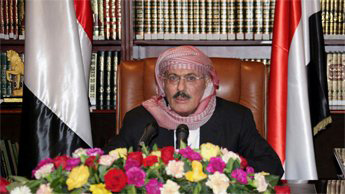
[Over at Waq al-Waq, Greg Johnsen has a good read on Salih’s latest speech after his return to Yemen.]
Salih’s Speech (Instant Analysis)
by Gregory Johnsen, Waq al-Waq, September 25, 2011
Days after dramatically returning from Saudi Arabia, President Ali Abdullah Salih did what he does in these situations: he gave a speech.
The international media will likely lead with the fact that Salih called for early elections (in fact, here is an early al-Jazeera piece saying just that). But what this analysis misses is the caveat – that ever present out – that Salih gave himself, saying that elections would only take place in the context of the GCC deal.
The GCC deal, as those of you who read Waq al-waq frequently know, is worthless. Not only is it impossible to enforce – as Salih’s will-I, won’t-I dance illustrates – but there are so many loopholes in the plan that even if Salih did sign it he could easily manipulate the aftermath of the deal to ensure that a trusted ally or relative succeeded him as president, or find some excuse to continue in power.
To that end, Salih reaffirmed that his vice president Hadi is authorized to negotiate and eventually sign the GCC deal. This is worthless. And Salih knows it.
Numerous high-level Yemeni figures have already signed the deal, the signature that is missing is Salih’s. This is yet one more evasion from a president who sees his strategy of duck and delay starting to pay-off.
This is a traditional tactic that Salih employs in tight situations. He pushes responsibility off to key aides who, western politicians more enamored of titles than the personalities at play believe have some real power. These allies and politicians are expendable – only Salih himself is not. He will willingly sacrifice any of their careers to save his own.
Salih did this with Prime Minister Bajammal back in 2005.
Salih also talked about al-Qaeda – an obvious nod to the US, basically sending the message, you think AQAP is bad now, you don’t want to see them if I’m overthrown.
I hope the US is smart enough to see through this self-serving rhetoric, but nothing in their public posture gives me much hope.
I’m not sure what anyone was really expecting from this speech. Salih was never going to resign during it.
According to people on the ground (like Tom Finn’s twitter feed) many of the Yemenis protesting Salih’s rule didn’t even watch it. They’ve lived with his rule for three decades, they knew what he was going to say.
So where does this leave us?
The speech was nothing new, the same play Salih and his family have been running for weeks. Taken from their perspective, this makes sense. Their strategy is working, the coalition against them is fracturing. Their enemies are still their enemies, but there is more sniping, backbiting, and mistrust among Salih’s enemies – and he can work with that – that is how he has survived 33 years in power.
Unfortunately, this means more clashes and more bloodshed with no obvious endgame in sight.
What is clear by now is that if left to drift, Yemen will continue to crumble into chaos and disorder. On the current course, Yemen is not going to correct itself. It needs outside help, primarily a unified front from the US and Saudi Arabia, but sadly the US has missed months of opportunities to do just that.
Yemen’s protesters and those on the outside all hope that it is not too late. But hope, even desperate hope isn’t much of a strategy.